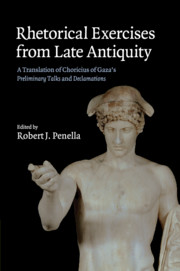 Rhetorical Exercises from Late Antiquity
Rhetorical Exercises from Late Antiquity Book contents
- Frontmatter
- Contents
- List of contributors
- Foreword
- Introduction
- I CHORICIUS, PRELIMINARY TALKS
- II CHORICIUS, DECLAMATIONS
- 2 Declamation 1 [X]:
- 3 Declamation 2 [XII]:
- 4 Declamation 3 [XIV]:
- 5 Declamation 4 [XVII]:
- 6 Declamation 5 [XX]:
- 7 Declamation 6 [XXIII]:
- 8 Declamation 7 [XXVI]:
- 9
- 10 Declamation 9 [XXXV]:
- 11 Declamation 10 [XXXVIII]:
- 12 Declamation 11 [XL]:
- 13 Declamation 12 [XLII]:
- Epilogue: The fortune and reception of Choricius and of his works
- Bibliography
- Index
9 - Declamation 8 [XXIX]: <A Spartan Citizen>
from II - CHORICIUS, DECLAMATIONS
Published online by Cambridge University Press: 29 January 2010
- Frontmatter
- Contents
- List of contributors
- Foreword
- Introduction
- I CHORICIUS, PRELIMINARY TALKS
- II CHORICIUS, DECLAMATIONS
- 2 Declamation 1 [X]:
- 3 Declamation 2 [XII]:
- 4 Declamation 3 [XIV]:
- 5 Declamation 4 [XVII]:
- 6 Declamation 5 [XX]:
- 7 Declamation 6 [XXIII]:
- 8 Declamation 7 [XXVI]:
- 9 Declamation 8 [XXIX]:
- 10 Declamation 9 [XXXV]:
- 11 Declamation 10 [XXXVIII]:
- 12 Declamation 11 [XL]:
- 13 Declamation 12 [XLII]:
- Epilogue: The fortune and reception of Choricius and of his works
- Bibliography
- Index
Summary
[THEME]
When ugly girls were being born in Lacedaemon, Lacedaemonians came to Delphi to seek a cure for the affliction. The god [Apollo] proclaimed that the disease had fallen on Sparta because of the anger of Aphrodite, who was outraged at some recent event. The goddess would cease from her anger when honored by a statue. They commissioned the statue from Praxiteles, who practiced this art. Having completed a statue modeled on the courtesan Phryne, his paramour, he inscribed it with the name “Aphrodite.” An assembly convened to consider the matter. Praxiteles urges the statue to be accepted, while a certain Spartan citizen speaks against it. Let us declaim the part of the Spartan.
EXPLANATORY COMMENT
[1] Why on earth, they say, did the speech invent this theme with its Spartan setting, and why does it imagine convening a Laconian assembly and enjoy describing their customs? A statue of a lewd woman is being rejected, and the Spartans are the most modest of all Greeks; hence the speech blames all the more the lover of Phryne, comparing him to the decency of Lacedaemon. [2] In a similar spirit long ago, Demosthenes also elaborated a rather bitter attack on the licentiousness of Aeschines. For after gathering a tyrannical drinking party and introducing Aeschines to the feast and then making the man drunk and, while he was in a drunken state, inciting him to a passion for an Olynthian woman, Demosthenes' account brings Iatrocles to the party, a man devoted to self-control, providing proof of the shamelessness of Aeschines by introducing that man's decency; for to a temperate observer, drunkenness is a demonstration of extreme lack of self-control.
- Type
- Chapter
- Information
- Rhetorical Exercises from Late AntiquityA Translation of Choricius of Gaza's Preliminary Talks and Declamations, pp. 158 - 176Publisher: Cambridge University PressPrint publication year: 2009


